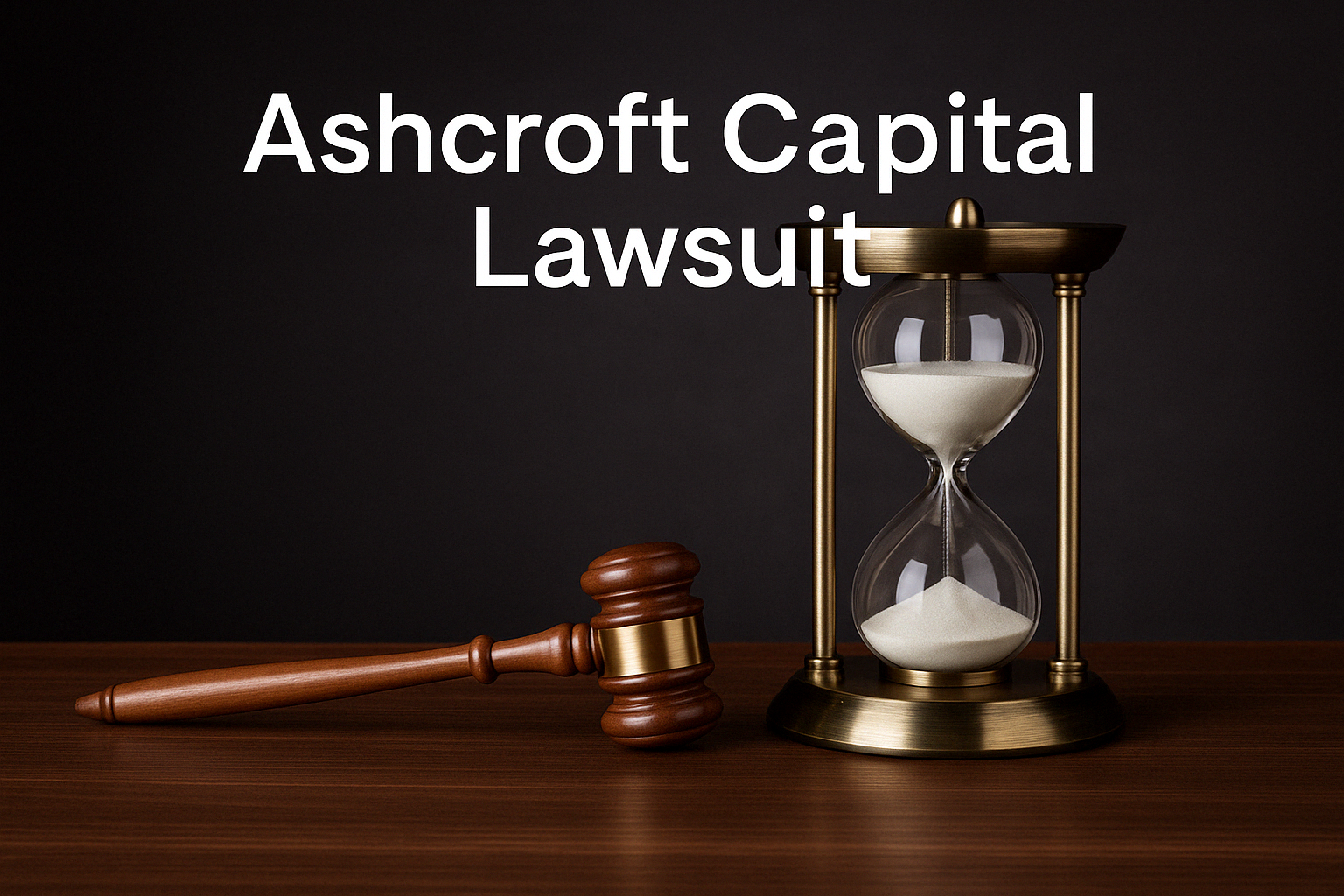Understanding the Ashcroft Capital Lawsuit: A Wake-Up Call for Investors
In the dynamic world of real estate investment, trust, transparency, and financial ethics play pivotal roles in determining the success and reputation of any investment firm. That’s why the Ashcroft Capital lawsuit has stirred considerable attention within financial and real estate circles. For investors, both seasoned and new, the unfolding legal issues surrounding Ashcroft Capital are not only alarming but also potentially instructive. As the details of this case become public, many are left wondering: What went wrong? Could it have been prevented? And most importantly, what does it mean for investors going forward?
Ashcroft Capital, known for its aggressive marketing and attractive real estate syndication deals, built a reputation for offering promising returns by pooling funds from investors to acquire and manage large multifamily properties. Founded by Joe Fairless and focused on real estate syndication and investment opportunities, Ashcroft Capital rapidly attracted attention through podcasts, newsletters, and educational platforms. Their messaging resonated with people seeking passive income and financial independence. However, the recent Ashcroft capital lawsuit questions whether the firm’s operations were as solid as its projected image.
What Sparked the Ashcroft Capital Lawsuit?
At the heart of the Ashcroft Capital lawsuit are allegations concerning misrepresenting investment risks, lack of transparency in fund usage, and breaches of fiduciary duties owed to investors. According to court filings, several plaintiffs allege that Ashcroft Capital failed to provide transparent financial reporting and may have misled investors about the potential returns and risks of various real estate investments.
One central point of contention lies in how investor funds were allocated and whether those allocations were consistent with what was promised during the initial offering documents. Investors allege that while they were shown projections of high double-digit returns, the actual financial performance of many properties was underwhelming, raising suspicions about the accuracy of forecasts and whether they were rooted in realistic forecasting or overly optimistic marketing tactics.
Moreover, it’s been suggested that the firm may have engaged in questionable property management practices or failed to meet specific due diligence standards, which in turn affected the performance of the assets and the safety of investor capital. If proven, these actions could constitute serious violations of securities laws and ethical standards expected of financial stewards.
The Role of Regulation and Due Diligence
One key element that the Ashcroft capital lawsuit brings into focus is the role of regulatory bodies such as the Securities and Exchange Commission (SEC) in overseeing private real estate investment firms. Typically, real estate syndications like those offered by Ashcroft Capital are conducted under Regulation D exemptions, which allow firms to raise capital from accredited investors without registering the offerings with the SEC. While this provides flexibility and efficiency, it also limits the level of oversight and disclosure that investors receive compared to publicly registered investments.
This lack of mandatory transparency makes it crucial for investors to perform thorough due diligence before committing their capital. Investors must review offering memorandums carefully, question projected returns, and ensure the operating team has a history of ethical behavior and successful project execution. The Ashcroft Capital lawsuit serves as a reminder that rigorous vetting of investment sponsors is necessary no matter how convincing a marketing campaign may be.
Investor Reactions and Concerns
The investor community has responded quickly to the news of the lawsuit. For many, especially those who have invested significant portions of their portfolios into Ashcroft Capital’s funds, the lawsuit is a source of distress and uncertainty. Some investors are now questioning whether they will ever see their capital returned, let alone the profits that were once projected.
Beyond the immediate financial implications, there’s a broader concern about trust and integrity in the real estate investment industry. Many investors relied on the firm’s media presence and charismatic leadership, particularly Joe Fairless, who cultivated a personal brand around transparency and financial education. The lawsuit casts a shadow over this image and may leave many wondering whether other popular real estate syndication firms might also engage in similar questionable practices.
There are concerns about what this could mean for future capital-raising efforts within the real estate syndication industry. As lawsuits like this gain public traction, potential investors may become more hesitant to participate in these deals, resulting in decreased capital flow and potentially lower valuations across the multifamily real estate sector.
Lessons for Current and Prospective Investors
While the Ashcroft capital lawsuit is undoubtedly a setback for those involved, it can also serve as a powerful case study for investors looking to improve their investment strategy and decision-making process. One of the most important takeaways is the necessity of independent verification. Investors should not rely solely on information provided by sponsors. Third-party reports, background checks, and past performance records should all be scrutinized.
Another key lesson is the importance of understanding the legal structure of the investment. Were the investors limited partners (LPs) or general partners (GPs)? What rights did they have to access information, and how enforceable were those rights? Many investors don’t fully understand the legal documents they sign, which can limit their ability to seek recourse in cases of mismanagement or fraud.
It’s also crucial to assess how diversified one’s investment portfolio is. If a large portion of one’s capital is tied up in a single sponsor or fund, the risk exposure becomes far more significant in the event of legal trouble. This lawsuit underscores the importance of diversifying across sponsors, asset types, and geographical regions to mitigate potential losses.
Could This Be a Sign of Broader Industry Issues?
While isolating the Ashcroft Capital lawsuit as a one-off case is easy, it could very well be symptomatic of deeper issues within the booming real estate syndication space. The last decade has seen an explosion in new syndication firms thanks to rising property values, low interest rates, and the appeal of passive income. Many of these firms are run by inexperienced operators who may lack the operational expertise or ethical grounding necessary to manage millions in investor capital.
The lawsuit may serve as a warning bell for the industry to reevaluate its standards, improve transparency, and implement stricter compliance measures. Investor advocacy groups and regulators may also begin to push for enhanced disclosures, even for private investment offerings, to protect participants in the future.
The Road Ahead: What’s Next for Ashcroft Capital?
As the legal process unfolds, Ashcroft Capital faces a challenging road ahead. The reputational damage alone could severely limit the firm’s ability to raise new capital, even if the lawsuit is resolved. If any of the allegations are proven true, the firm may face fines, restitution orders, and possibly even criminal investigations, depending on the severity and nature of the misconduct.
The lawsuit’s outcome could determine whether investors recover any of their investments or simply write off their contributions as a total loss. Depending on how the lawsuit evolves, some may choose to file separate claims or join class-action efforts.
Ashcroft Capital may undergo restructuring or be acquired by another firm to salvage its operations. However, restoring investor trust will be a long-term challenge beyond financial or legal solutions.
Final Thoughts: Proceed With Caution
The Ashcroft Capital lawsuit is a sobering event in passive real estate investing. It highlights the vulnerability of even the most promising opportunities to poor management or ethical lapses. Investors are reminded that while the lure of attractive returns is enticing, it should never replace thorough due diligence, critical thinking, and prudent risk management.
For now, those watching from the sidelines should take the opportunity to review their investment strategies, educate themselves about legal protections, and prioritize transparency in all future dealings. Only time will tell how this lawsuit plays out, but one thing is sure—its impact on the investor mindset is already being felt.
Also, Read The Following: Mygreenbucks.

